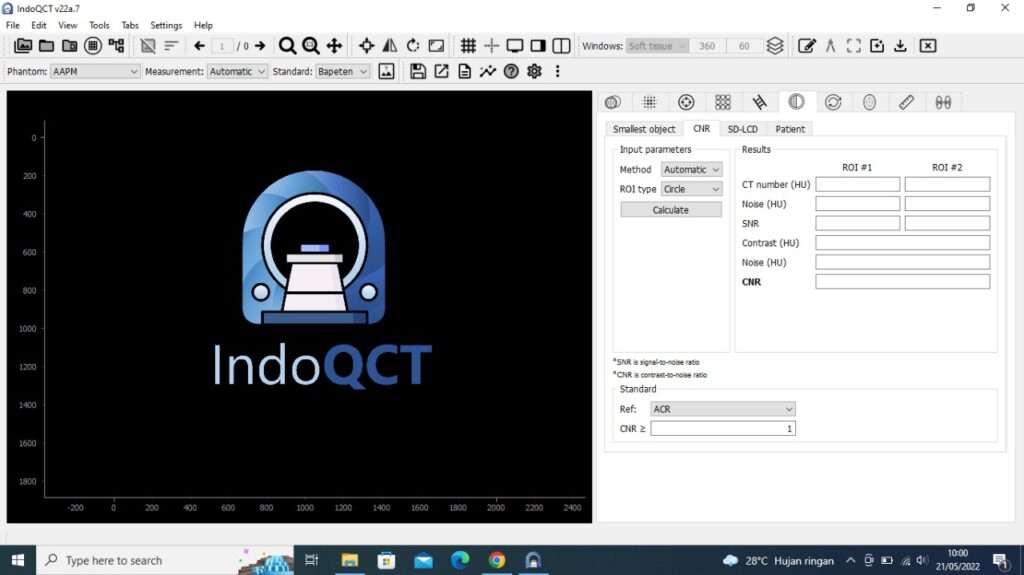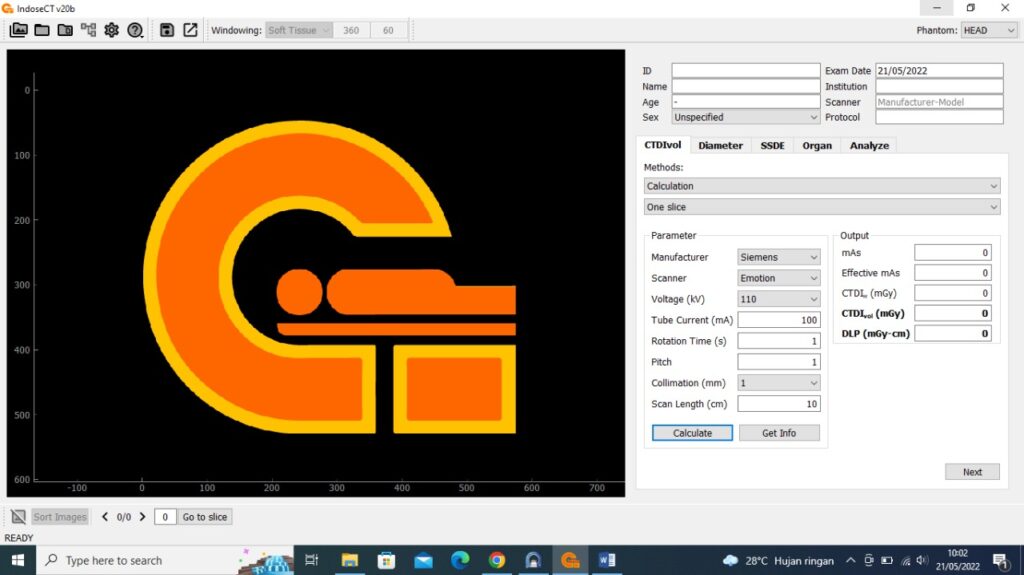The Summer Course in Medical Physics 2022 is organized by the Department of Physics, Faculty of Science and Mathematics (FSM), Diponegoro University (UNDIP), Semarang, Central Java, Indonesia. The Summer Course is a fourteen days online activity that will expose the participants to knowledge and skill in post-processing image quality measurements of computed tomography scan’s results using IndoQCT and IndoseCT software. Moreover, its quality performance is also compared with dose measurements to ensure optimal future CT scanning protocol. In brief, the summer course will covers various practical measurement skills as follows: CTDIvol, SSDE concept, Dosimetry for CT with TCM technique, CT number consistency, uniformity, and homogeneity, CT number linearity, Noise and NPS, Spatial resolution (visual observation, MTF, and TTF), Low-contrast detectability, Slice thickness, CT alignment and gantry tilts, Advanced image quality (measurement from patient image), Concept of noise reduction (MF, AMF, SMF, BF, NLM).
About IndoseCT (indosect.com)
ndoseCT 15.a is the first version of IndoseCT, while IndoseCT 20.b is the second version. IndoseCT was first developed in 2015. IndoseCT has been recorded in the Letter of Registration of Creation, Ministry of Law and Human Rights (Kementerian Hukum dan HAM), Republic of Indonesia, Number 000217029, on August 12, 2020.
IndoseCT is a software to calculate and manage the radiation dose of a patient undergoing computed tomography (CT) examination. It does not only calculate the radiation output dose of CT machines (in terms of volume CT dose index, CTDIvol), but also the individual dose received by each patient (in terms of size-specific dose estimate, SSDE) either based on the effective diameter (Deff) or water-equivalent diameter (Dw). This software can also calculate radiation output and patient dose for CT equipped with tube current modulation (TCM) technique.
Until 2011, CT doses had been expressed in terms of CTDIvol, whereas that metric is only able to quantify CT radiation output. The CTDIvol value is influenced by almost all input parameters, such as tube voltage (kVp), tube current (mA), rotation time (s), pitch, collimation width, and others. It was noted, since its introduction, that CTDIvol was not meant to indicate the radiation dose received by the patient. This is because the dose within each scanner is influenced by not only the radiation output from the CT machine, but also by the characteristics of the patient undergoing the examination, such as the size of the patient and the composition of the body part being examined. To quantify a patient’s radiation dose, the size-specific dose estimate (SSDE) was introduced.
IndoseCT software estimates the radiation dose directly for each individual patient using the patient’s image or by entering patient data manually. IndoseCT can also be used for the estimation of organ dose and effective dose. The effective dose is the dose commonly used to estimate the risk of developing cancer in the future from CT examinations. IndoseCT is also equipped with tools to store patient dosimetry data in a database. From this database, the software can process patient dosimetry data and easily display its graphs so that it becomes useful information for dose optimization for the use of ionizing radiation for stakeholders, whether for medical physicists, radiology doctors, hospital management or regulatory agencies.
About IndoQCT
If IndoseCT is software for measuring patient doses from CT examinations automatically, then IndoQCT is software for measuring CT image quality automatically. IndoQCT is able to measure many CT quality parameters (either manually or automatically), including: CT number (accuracy, uniformity, homogeneity, linearity, histogram, and profile), noise (tolerance, uniformity, NPS), spatial resolution (visual, MTF based on point, MTF by edge, and TTF), slice thickness, low-contrast resolution (visual, CNR, LCD statistical calculations), CT alignment, gantry tilt, distance accuracy, and distance between slice accuracy. IndoQCT can measure CT quality parameters from several types of phantoms available in the market, such as AAPM CT performance phantom, ACR CT accreditation phantom, CatPhan phantom, and phantoms supplied by CT vendors (GE, Siemens, Philips, and Toshiba). Moreover, several CT quality parameters can be measured directly from patient clinical images, such as CT number, noise, low contrast-detectability, spatial resolution (under development), and alignment.

With using IndoQCT, various image quality parameters can be set and then detected either manually or automatically using computational phantoms. This is useful for educational purposes in order to provide a direct overview to students. Several filters for noise suppression are equipped in IndosQCT, such as adaptive mean filter (AMF), selective mean filter (SMF), bilateral filter (BF), non-local mean (NLM) filter, wavelet filter, and others. Moreover, additional features also included, such as resizing images, rotating images, shifting images. An interesting thing that is not available in any other software, in IndoseCT, multi-windows blending can be performed, so that 2 or 3 windows can be displayed in one image in the form of color (red-green-blue).
Contact detail
Questions regarding the summer course and its registration process can be directed to the summer course Coordinator, Pandji Triadyaksa Ph.D, at p.triadyaksa@fisika.fsm.undip.ac.id
Fee and Registration
- The summer course is free of charge with only accepting limited number of participants.
- The admission process starts from June 1 – July 11, 2022 or until the number of participants is fulfilled.
- International students (undergraduate and graduate) are welcome to apply using the registration link provided at: admission.undip.ac.id
- On this page, you will be required to create an account to LOGIN. Therefore, please check the following sequence of procedures for more detail information:
berita terkait https://fsm.undip.ac.id/en/summer-course-in-medical-physics-3/

